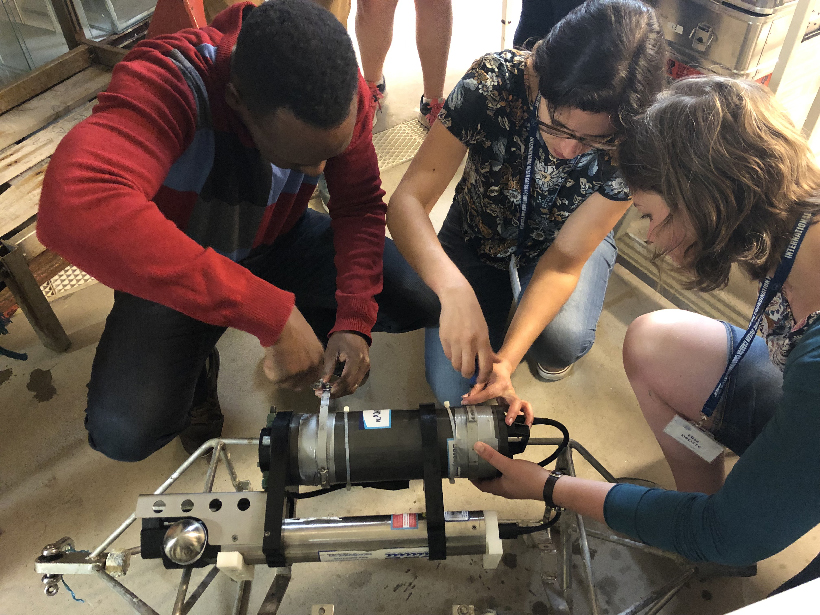A knowledge gap remains between ocean sensor technology and many end users. This gap is born out of a lack of training and community coordination.
Modern ocean technology provides scientists with cost-effective sensors that can automatically take measurements of essential ocean variables. Researchers can place these sensors on autonomous platforms, a practice that is complementary to traditional ship-based sampling and that furthers the goal of improving data coverage worldwide. However, a knowledge gap remains between ocean sensor technology and many end users. This gap is born out of a lack of training and community coordination, together with a disconnect between the data gathering and data quality assurance that are required for various ocean applications and data products created for societal benefit.
To help train a new generation of marine biogeochemists in the appropriate use of a suite of biogeochemical sensors and to ensure the best possible quality of the data produced, the International Ocean Carbon Coordination Project and the European Union’s BONUS Integrated Carbon and Trace Gas Monitoring for the Baltic Sea (INTEGRAL) project held a 10-day training workshop at the Sven Lovén Centre for Marine Sciences in Kristineberg, Sweden, this past June. The workshop was attended by 27 outstanding early-career scientists, including 18 women scientists, selected from almost 140 applicants. The attendees were joined by 20 dedicated instructors, who shared their practical expertise with a variety of sensors:
- Multiple optode-type optical oxygen sensors
- Chlorophyll fluorescence and backscatter/turbidity sensors for bio-optical measurements
- Ion-sensitive field-effect transistor (ISFET)- and spectrophotometry-based pH sensors
- Membrane-based sensors and an underway system (which moves through the water rather than being moored) for measuring partial pressure of carbon dioxide (pCO2)
This intensive workshop provided trainees with lectures and hands-on experience across the whole spectrum of operations—from deployment and interfacing, through troubleshooting and calibration, to data reduction, quality control, and data management.
Insights into complementary use of remote sensing, modeling, and smart data extrapolation techniques broadened participants’ perspectives and opened new avenues for research ideas and collaborations.
Insights into complementary use of remote sensing, modeling, and smart data extrapolation techniques not only broadened participants’ perspectives, but also effectively opened new avenues for research ideas and collaborations that they initiated during the course.
In their postworkshop evaluations, the participants agreed that the course succeeded in teaching best practices for the selected biogeochemical sensors and autonomous measurement systems and provided ample guidelines and practical tips regarding specific reporting requirements (e.g., metadata, calibration, validation, error estimates). This training course was thus well suited for the next generation of users of large-scale biogeochemical ocean observation networks centered around profiling floats, moorings, and gliders, as well as around research and commercial vessels.
Perhaps most important, this workshop succeeded in forming a tight network of almost 50 biogeochemical sensor users, combining experts with beginners from 19 countries and six continents and representing a total of 26 nationalities. The benefits of networking enabled by this workshop are already evident through active communication maintained among the participants.
To broaden the impact of and leave a legacy from this course, the organizers have partnered with the Ocean Teacher Global Academy (OTGA) to share the training materials, including video recorded lectures, with the broad ocean community via the OTGA course website.
Author Information
Artur P. Palacz ([email protected]) and Maciej Telszewski, International Ocean Carbon Coordination Project, Institute of Oceanology of the Polish Academy of Sciences, Sopot, Poland; and Gregor Rehder and Henry C. Bittig, Leibniz-Institut für Ostseeforschung Warnemünde, Rostock, Germany
Citation:
Palacz, A. P.,Telszewski, M.,Rehder, G., and Bittig, H. C. (2019), Training the next generation of marine biogeochemists, Eos, 100, https://doi.org/10.1029/2019EO136334. Published on 06 November 2019.
Text © 2019. The authors. CC BY-NC-ND 3.0
Except where otherwise noted, images are subject to copyright. Any reuse without express permission from the copyright owner is prohibited.

